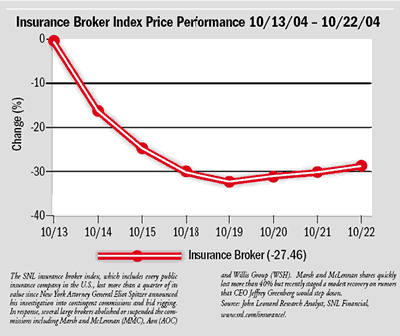

New York Attorney General Eliot Spitzer’s filing on Oct. 14 of charges against giant insurance broker Marsh for alleged commercial account steering and bid rigging has already had significant impact on Marsh and is expected to reach into the insurance brokerage community and the independent agency force.
Many observers expect the impact to deepen as Spitzer expands his probe of placement service agreements (PSAs) and other contingency commission deals to other companies and lines of insurance and as other courts and states get involved. Spitzer’s office has even suggested it could reach down to independent agents in their dealings with individual consumers.
“We are looking at the big insurance companies to see if there have been payments designed to influence small independent brokers,” David Brown, chief of Spitzer’s investment bureau told USA Today. “If brokers have been less than objective in giving their advice to (individual consumers), we think that is a problem.”
Independent agents see things differently. While not condoning bid rigging or any illegal activity, they note that there is a fundamental difference between an independent agent and a broker that is not always understood by the public. Agents have a fiduciary responsibility to the insurance company they represent, while brokers do not–brokers work for their customers.

Robert Rusbuldt, CEO of the Independent Insurance Agents & Brokers of America (IIABA), which the week before approved a new disclosure policy on contingency contracts, vigorously defended their place in the independent agency system. He said that contingency and profit sharing agreements are legal in the states and that such arrangements are central to sales organizations.
“The more you sell, the more incentives,” he told IJ. “It’s the American way.”
He acknowledged that even disclosure, however, is not ideal because the dollars involved are usually not known at the time of an individual sale.
He said he does not think states will radically alter agencies’ compensation programs after the Marsh controversy fades. (See Rusbuldt’s ‘Parting Shots,’ page 58.)
While the impact on independent agents remains unknown, the immediate impact of Spitzer’s charges on Wall Street were clear. Shares of Marsh fell 37 percent in just two days afeter Spitzer’s announcement. Shares of AIG, ACE and Hartford Financial Services Group–three carriers cited in the big-rigging aspect of the complaint–all dropped as well. Even some companies not implicated by Spitzer–Aon and Willis–saw their shares fall. European insurance shares also took a tumble after news of the U.S. lawsuit was learned.
At Marsh, the world’s largest insurance broker, the charges have brought about several internal changes. The brokerage firm named a former trial lawyer as its new chief executive; announced that its board of directors had ordered an independent internal investigation; and suspended all contingency contracts of the type that have gotten it in trouble.
Marsh named Michael G. Cherkasky as chairman and chief executive officer. Formerly with Marsh Kroll, a risk consulting subsidiary, Cherkasky has a background as a manager, prosecutor, investigator and trial attorney. Prior to joining Kroll, Cherkasky spent 16 years in the criminal justice system, including serving as chief of the Investigations Division for the New York County District Attorney’s Office.
Marsh also learned that a class action lawsuit on behalf of shareholders has been filed against it. The complaint alleges that defendants violated federal securities laws by failing to disclose that hundreds of millions of dollars of the company’s profits derive from illegal activities, namely “contingent commissions.”
Marsh is not alone in being targeted in a class action suit. A Chicago judge in late July approved a class action lawsuit against Aon Corp. alleging that the insurance brokerage breached its fiduciary duty by taking contingent commissions from insurers without disclosing them to policyholders.
Observers are predicting there will be additional lawsuits against brokers on behalf of shareholders and customers.
In addition to fostering costly litigation, the charges initiated by Spitzer are expected to affect the revenue and profitability structure of the broker sector over the long term, according to industry insiders and security analysts who follow insurance.
Cochran, Caronia Securities LLC, out of Chicago, notes that contingent commissions comprise 5 percent of revenues and 15 percent of earnings for publicly traded brokers. “Reduction or elimination of revenues related to these arrangements would have an obvious negative effect on profitability,” the analysts noted in a report.
The revenue adjustments will likely be harder on global brokers than on regional brokerage firms, which may have more flexibility, Cochran, Caronia Securities suggested. Other sectors, including commercial insurers, reinsurance, specialty lines and personal lines should be affected only marginally, if at all.
J.P. Morgan Chase & Co. analysts predicted Spitzer’s efforts will produce a “seismic shift” in property/casualty business practices.
American International Group (AIG) Chairman Maurice Greenberg said that while he does not think his own company’s business will be hurt, he agreed that the controversy could lead to changes in the way brokers are paid. He suggested that AIG would stop agreeing to brokers’ contingent commissions.
The impact was also felt beyond property/casualty with the acknowledgement by MetLife that it had received four subpoenas from Spitzer’s office, including ones pertaining to possible inflated bids.
Also, National Financial Partners Corp., which sells investments and insurance, said it has received subpoenas.
Jeffrey W. Greenberg, who at the time Spitzer’s lawsuit was filed was MMC’s chairman and CEO, said that his firm has taken “strong and immediate action,” including suspending all marketing services agreements (MSAs) under which contingent commissions are paid and “actively reviewing every aspect of Marsh’s business.”
Apparently “strong and immediate action” included ousting Greenberg, who on Oct. 25 was asked by MMC’s Board of Directors to step down.
Greenberg’s departure apparently mitigated somewhat Spitzer’s ire at the company. Reacting to the board’s decision to let Greenberg go, Spitzer commented in a release that the action would allow “Marsh and this office to move forward toward a civil resolution of our lawsuit.”